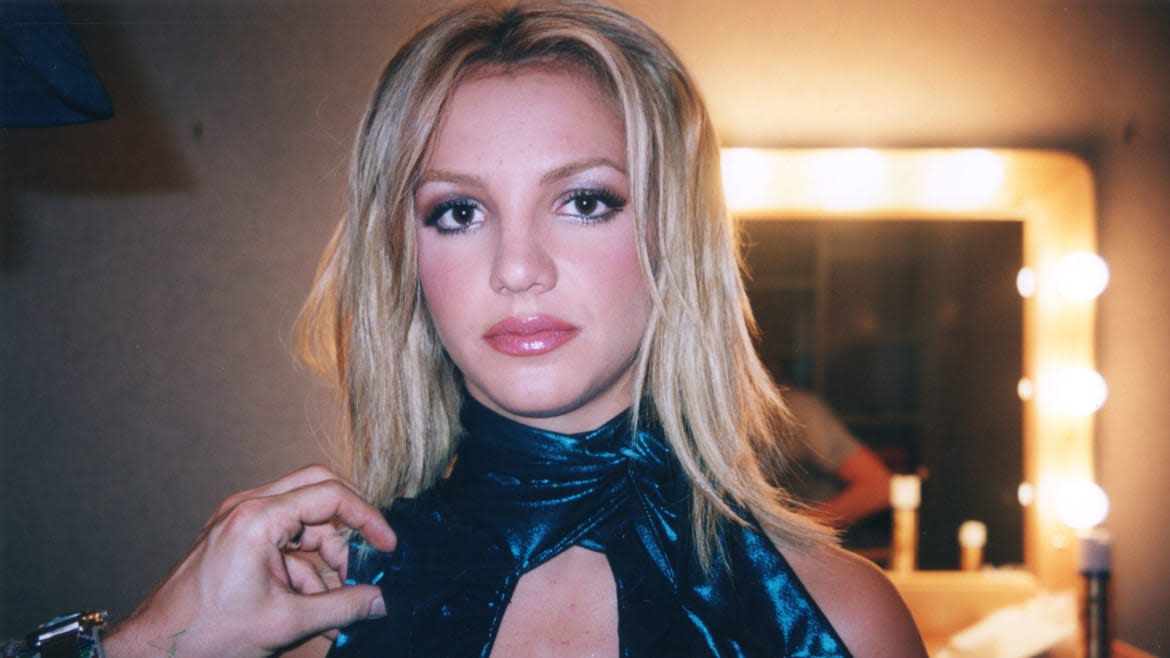The #FreeBritney Movement Is About to Become a War

- Oops!Something went wrong.Please try again later.
What is going on with Britney Spears?
That’s the central question in the new documentary Framing Britney Spears, the latest installment of FX and Hulu’s The New York Times Presents documentary series, premiering Friday on the streaming service. It’s been a question for over a decade now, since the pop superstar was first placed under a conservatorship that stripped her of any control over her life, career, and finances.
Some would argue it’s been a valid question over the entirety of Spears’ two-plus-decade career, one that saw various demands for the kind of celebrity she should be transform her into an enigma preyed upon by a lecherous media, the industry, her team, and, according to her fans, members of her own family.
And so what has been called the #FreeBritney movement has been on the rise, a passionate battle cry in support of a fan army’s noble leader.
Dissecting Spears’ social media posts, past interviews, and court filings related to her conservatorship, they are adamant that she is being constrained by the conservatorship’s legal straitjacket against her will and needs the support of a grassroots crusade to pressure the courts to, well, set her free.
All of this is, of course, confusing and complicated. It’s decades of the pressure of fame and being seen as a money-making commodity starting to swallow the woman at the center of it. It’s also mental breakdowns, custody battles, and family riffs, and with them the ensuing 5150 psychiatric hold, trips to rehab, and the conservatorship at the center of all this.
The Extremely Chaotic 2021 Golden Globe Nominees: 17 Craziest Snubs and Surprises
A conservatorship is a legal framework usually meant for elderly people who have lost their faculties, with an overseer in charge of all decisions of person and estate. The dictionary defines it as a tool to protect the interests of “an incompetent.”
Yet Spears is a woman who, since her conservatorship began in 2008, has recorded several hit albums, acted in television shows, performed sold-out concert tours, established a record-breaking Las Vegas residency, and been at the center of a massively successful and demanding career.
That doesn’t square with someone who is legally viewed as incompetent or unable to make her own decisions. It also, fans note, doesn’t square with the desire for independence and control that Spears has avowed both in press interviews and, more subtly, in the messaging of her music.
The past year has seen a flood of reports of discord between Spears and her father, James, who had been paid to be in charge of her conservatorship since its start. Family members began suggesting that she no longer wanted to be under his—or its—control, and furthermore never had wanted to. In August 2020, Spears’ lawyer spoke on her behalf saying that she was afraid of her father and refused to work until he no longer managed her career.
So what is going on with Britney Spears? Framing Britney Spears doesn’t necessarily answer that question, or offer new revelations or insights into her conservatorship fight. Perhaps the biggest question—what is currently, and what has been, Spears’ mental state—is explicitly unanswered. But it does provide a robust, almost bullet point-like summary to help those interested get up to speed on the ins and outs of her conservatorship and what exactly is behind the #FreeBritney movement.
It traces Spears’ lifelong ambition to be a performer and past as a person once in charge of her career and artistic vision, before the chaos of superstardom sent her personal life spiraling. “I am where I am today because I do have control. You just control what you do. You have to, otherwise you get sucked in by people who are not necessary,” she says in one archival interview, for example.
But most fascinating are the characters from Spears’ life who have mostly been cast out, some of whom, like her former chaperone and “assistant” Felicia Culotta, are speaking out for the first time about the conservatorship and their feelings about James Spears and his motives.
The film rounds up the specific examples that #FreeBritney fans have mined from social media and court filings to argue that she is being forced into legal agreements against her will. A concise tick-tock for casual followers of what’s going on with Spears helps to understand better the passion behind these fans’ demonstrations.
With carefully chosen talking heads from the legal world and the media that’s covered her volatile career over the years, the documentary plays out as even-handed as you’d expect from a series titled The New York Times Presents. But it also, with the evidence it presents, has the effect of legitimizing the concerns of a fan army that at one point had been written off as hysterical fanboys and fangirls.
The Times has run several large features and done detailed reporting on Spears’ conservatorship and the #FreeBritney demonstrators, which in turn has leant gravitas to the story. The reporting has elevated the concerns about Spears’ mental state and the level of her autonomy while in turn reframing the story as a moratorium on the country’s conservatorship system as a whole and the ways it might be abused.
In the end, it’s hard to imagine a documentary like this not having the effect of recruiting more soldiers into what’s evolved from a #FreeBritney movement to what may soon become a war.
If you’re a Britney Spears fan, you know Felicia Culotta. She was such a presence in the public-facing adorableness of Spears’ early rise that she herself would get fan mail. Culotta has known Spears since she was 5 years old, and, after Spears scored her first record deal at age 15, traveled the world with her as a chaperone.
“To be honest, I didn’t then nor do I now understand what a conservatorship is,” Culotta says. “Especially for somebody Britney’s age, and somebody capable of so much that I know firsthand that she’s capable of.”
Much of the conservatorship talk has been framed around confusion that James (Jamie) Spears was put in control despite not having had a major role in the singer’s life before that. Kim Kaiman, who was senior marketing director at Jive when Spears was first starting out, recalls, “The only thing Jamie ever said to me is, ‘My daughter is going to be so rich, she’s gonna buy me a boat.’ That’s all I’m gonna say about Jamie.”
Those who worked with her also refuted what’s recently become a common conception of Spears: that she’s a zombie who needs other people to orchestrate her career, silently obeying what she’s told.

Britney Spears' father, Jamie Spears leaves the Los Angeles County Superior courthouse on March 10, 2008.
“That idea that Britney is a puppet that gets moved around and told what to do is incredibly inaccurate,” says Kevin Tancharoen, her former tour director. “She was the one who knew what she wanted to do and she would make that happen, or her people would make that happen for her… She was the boss.”
The documentary revisits the litany of traumas that led to Spears being placed under conservatorship in 2008, and the misogynistic and predatory ways the incidents were covered in the media: the partying with Paris Hilton, messy breakup with Kevin Federline, the head-shaving, attacking the paparazzi with an umbrella, losing visitation rights with her kids.
After she was involuntarily committed to the hospital in 2008 and the conservatorship began, it was speculated that she agreed to it because she was scared of not being able to see her kids again if she didn’t.
Vivian Lee Thoreen, a lawyer involved in the early months of the conservatorship representing Jamie Spears, insinuates that the court never would have granted a conservatorship without extreme necessity, and that the Spears’ family fear that she could be taken advantage of or duped financially was a motivating factor. Tellingly, since that interview, Thoreen has joined the legal team on Spears’ side of the battle.
We revisit something Spears said in an MTV documentary soon after her father gained control. She said that if she wasn’t under the constraints of the doctors, lawyers, and her father, “I would feel liberated. I would feel like myself. When I tell them the way that I feel, it’s like they hear me, but they’re really not listening. They’re hearing what they want to hear. They’re not really listening to what I’m telling them. It’s like, it’s bad.” After choking back tears, she says, “And I’m sad.”
Quotes like that are crucial clues for those who launched the #FreeBritney movement.
The campaign began in earnest after Spears abruptly canceled what was supposed to be a splashy new Vegas residency in 2019. Andrew Wallet, who had been co-conservator of her estate for over a decade alongside Jamie Spears, then quit. Soon after that, Spears herself disappeared from Instagram and social media, which had been a celebrated outlet for what appeared to be unfiltered communication with fans.
When she would later self-check into a rehab facility, fans’ suspicions grew, especially after the podcast Britney’s Gram, which would dissect Spears’ Instagram posts for messages hinting that she wanted independence, aired an anonymous voicemail suggesting that Spears was in rehab against her will. From there, the cause movement exploded.
The fascinating thing about Framing Britney Spears is that it not only elicits extreme empathy for Spears’ situation, whatever that situation may be, but it is slyly hopeful.
Last August, as the #FreeBritney folks are well aware, Spears began publicly signaling that she wanted changes. She asked the court to put a bank in charge of her estate and remove her father. In the court filing, her lawyer, on her behalf, seemed to directly acknowledge the #FreeBritney movement:
“At this point in her life when she is trying to regain some measure of personal autonomy, Britney welcomes and appreciates the informed support of her many fans. Although the sealing motion is supposedly for her ‘protection,’ Britney herself is vehemently opposed to this effort by her father to keep her legal struggle hidden away in the closet as a family secret… In this case, it is not an exaggeration to say the whole world is watching.”
In November, a court ruled that Jamie Spears would not be removed, despite Spears’ lawyer’s argument that she is afraid of her father and Spears’ mother’s counsel also acknowledging the “contentious” relationship and requesting a new conservator. That seemed like a loss, but the court did allow Spears to add a new co-conservator alongside her father, and left the door open that he could one day be removed.
What you’re left with, then, is a call to action. Basically, to join the #FreeBritney movement. Again, it’s complicated and there are no answers. As one lawyer says several times, “The problem is we don’t know what we don’t know.”
Got a tip? Send it to The Daily Beast here
Get our top stories in your inbox every day. Sign up now!
Daily Beast Membership: Beast Inside goes deeper on the stories that matter to you. Learn more.

